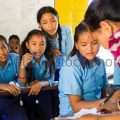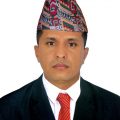
Editorial
We are delighted to present the third quarterly issue (July- September) of ELT Choutari of 2018, the 88th issue. The issue focuses on writing education in Nepali schools and universities.
We, the teachers of English in schools and universities teach about writing not writing itself. For instance, students are made to memorise what a paragraph means rather than making them write a paragraph on different topics. In the university, many students strive to create original pieces of writing. To meet the dates for submitting assignments, students ‘copy and paste’ in rush. They do not receive enough opportunity to practice writing in the classrooms. On the other hand, in schools, teachers generally write paragraphs, letters and essays on the board and students just copy them. They even memorise those notes including essays for the examination. Furthermore, there are ‘ready-made’ paragraphs, letters, job applications and essays in the markets; the “Bazaar Notes”. In a way, these notes make the teachers’ lives go easy. Of course, there are few teachers and students who invest their sufficient effort to practice writing processes in schools and universities. Interestingly, it has also been observed that the teachers and university faculties who have never produced a single piece of original writing in their career grade the students’ papers for their creativity and originality in writing. I mean, do we have experience of the process of writing? We need to rethink and revise the practice of teaching writing in our academic institutions.
In this connection, this 88th issue of ELT Choutari offers a wide range of writing practices, experiences and analysis of scholars. I believe that teachers, students and researchers will be benefited from reading these writings.
Here are nine blog posts for this issue:
- Thesis Writing: A Big Learning Opportunity: Nabina Roka
- Good Writing is All About Practice and Knowing its Requirements: Dr Hayes (by Jeevan Karki)
- Thesis Writing: A Next Step in Learning: Tara Rai
- Writing a Writing Education in Nepal: Dr Shyam Sharma
- Developing Students’ Writing Skill: Teachers’ Views from Far West: Januka Bhatta
- Academic Writing and the Reality in Universities: A Review of Academics’ Voices: Dr Karna Rana
- My Experience of Teaching Writing in School: Shanti Upreti
- Being Familiar with Academic Writing: Nani Babu Ghimire
- Teaching Writing at University Level: Practices from Far West Nepal
I would like to thank Choutari editors Dr. Karna Rana, Jeevan Karki, Praveen Kumar Yadav and a learning editor Narendra Airi for their reviews to release this issue. Finally, if you enjoy reading the blog posts, please feel free to share in your circle and of course, drop your comments in the boxes below. Likewise, please write your teaching-learning experiences and send us. We will give a space at Choutari. Our email is 2elt.choutari@gmail.com.

Ashok Raj Khati
The editor of the issue
